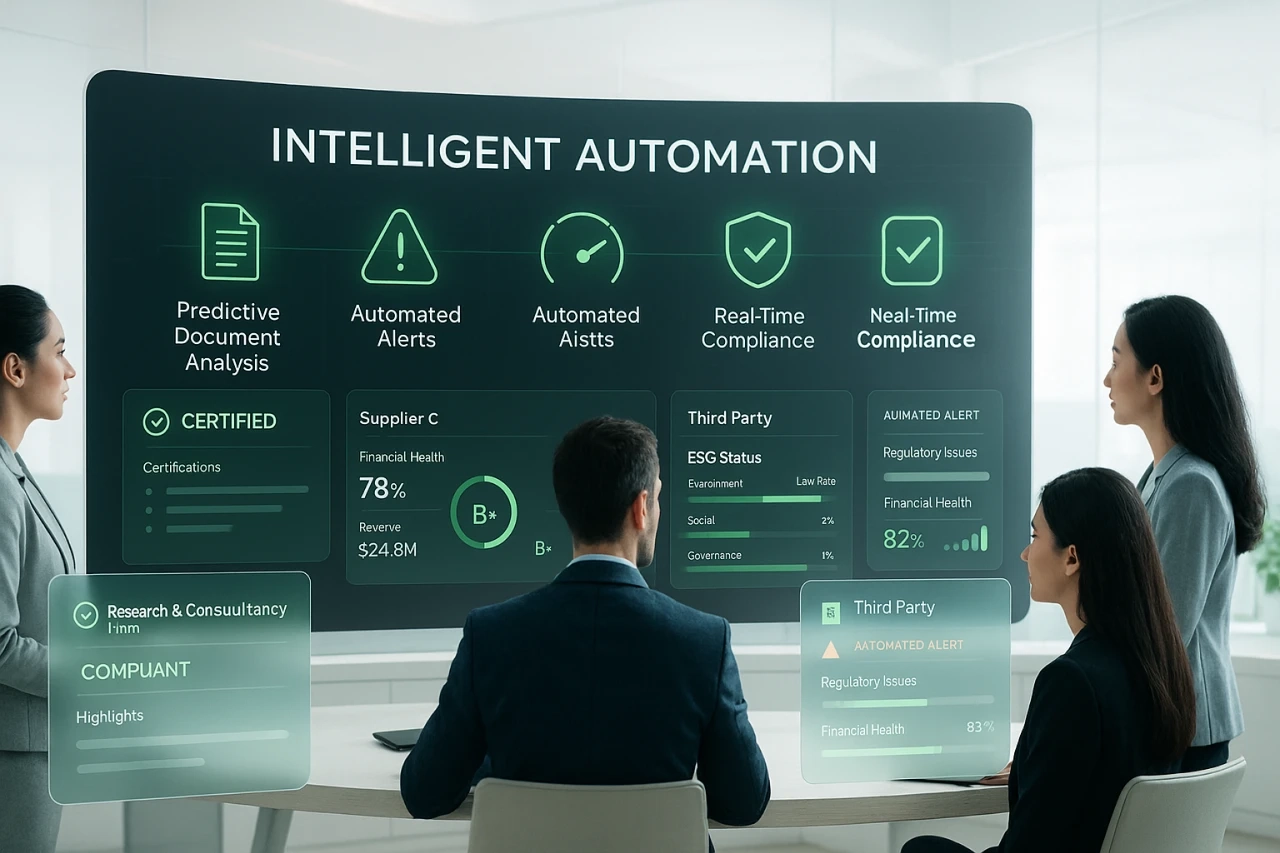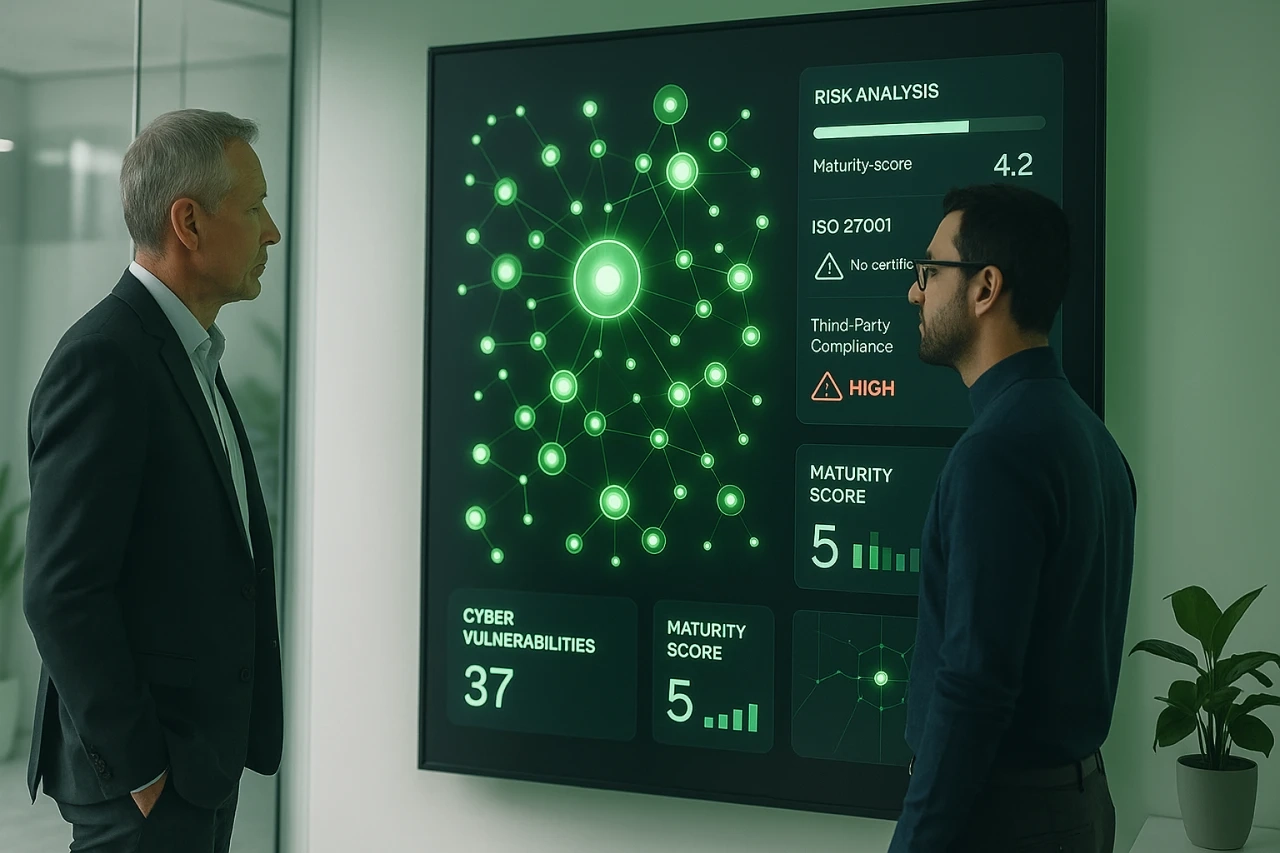Automated Evaluation Solutions: How to Streamline Without Sacrificing Quality

Automating evaluations is becoming an essential step for organizations looking to strengthen their third-party governance. IT decision-makers, especially in construction, industry, and the public sector, are seeking to combine efficiency and time savings with uncompromising quality assurance. Given concerns around the reliability of automation tools and the need for consistent performance, it’s crucial to debunk myths with recent advances in AI and intelligent automation.
Exploring the deployment of automation solutions in the management and optimization of third-party collaborative evaluations helps clarify the real stakes. In heavily regulated industries, it’s no longer just about delegating repetitive tasks, but about ensuring continuous quality assurance throughout the partner lifecycle. This shift involves establishing robust workflows and real-time document monitoring through specialized algorithms.
The shift toward effective third-party governance calls for a holistic approach that goes beyond basic document collection to integrate a true risk management strategy.
Myth vs. Reality: Can You Automate Without Compromising Quality?
The fear of quality loss with automation tools is still common among IT and compliance managers. This skepticism often stems from confusion between basic robotization and intelligent automation. The goal is not to replace human oversight but to enhance documentary and operational quality assurance controls.
Another goal is to focus on high-risk third parties while automating repetitive tasks for lower-risk ones.
Some worry about losing control when implementing automated processes, especially under strict normative criteria. In construction, tracking EN 1090 certifications requires rigorous documentation traceability. In industry, managing ICPE sites demands strict control of classified installation documents. Yet, the rise of artificial intelligence now enables automated document checks, personalized alerts, and contextual recommendations.
These innovations ensure durability and reusability of evaluations without compromising standards or sector-specific depth. Field deployment analysis confirms automation enhances precision: specialized algorithms detect documentation anomalies that human reviewers might miss in large data sets. This algorithmic accuracy ensures that automation strengthens rather than weakens evaluation quality.
In the public sector, this method allows local authorities to maintain compliance standards while significantly reducing supplier case processing times. This digital transformation of third-party governance demonstrates how technology and industry expertise complement one another.
Learn how intelligent automation can enhance the quality of your sector-specific evaluations with our personalized third-party governance assessment.
Automated Testing: What Are the Concrete Benefits?
Automated document testing is revolutionizing third-party evaluations using proven AI technologies. This transformation enables organizations to optimize third-party governance while upholding impeccable quality standards.
Field feedback highlights major time savings in each annual third-party review cycle. Predictive document analysis via AI, integrated into the Aprovall360 platform, automatically processes and classifies contracts, agreements, and compliance reports, reducing documentation review time significantly.
In construction, intelligent automation improves document traceability and streamlines validation cycles for EN 1090 certifications. Firms under tight regulations can preemptively spot non-compliances (e.g. related to posted workers), avoiding costly penalties.
Local governments also benefit: many have reduced administrative delays thanks to automation, a benefit acknowledged by most organizations in sector studies. This performance stems from the seamless integration of public procurement and GDPR requirements into automated workflows.
For ICPE industrials managing REACH requirements, automated controls verify transactional and contractual compliance, boosting accuracy and reliability.
Optimize your evaluation cycles now
with Aprovall360’s predictive document analysis, trusted by over 450,000 third parties worldwide.
AI and Real-Time Monitoring
Combining AI and intelligent automation transforms daily operations for teams monitoring third-party partners. Real-time document surveillance modules instantly flag anomalies, gaps, and emerging risks, enabling proactive incident management (e.g. automatic document invalidation).
Aprovall’s field experience reveals a significant drop in false positives, reducing “supplier fatigue” from excessive requests. This is made possible by AI-powered third-party risk management, which enables real-time risk scoring that adjusts dynamically.
Advanced monitoring tools adapt to specific needs: ISO standards in industry, social/environmental requirements in social housing and public procurement. AI can track regulatory changes in real time, predict business impact, and suggest compliance actions.
Balancing Standardization and Personalization
To avoid turning evaluation automation into rigid standardization, advanced solutions enable certain controls to be standardized while allowing essential customization. Each sector maintains its own requirements, while global workflow optimization gains in accuracy and reliability.
In distribution (marketplaces, e-commerce), tailored intelligent automation modules smooth onboarding and create a better experience for all third-party partners, even those unfamiliar with governance protocols. This balanced method reduces “supplier fatigue” by customizing questionnaires based on business risk profiles.
Document AI now supports automated document uploads and validation, while smart alerts on deadlines and compliance levels improve continuous monitoring. This holistic governance strategy responds flexibly to evolving DORA, NIS 2, or CSRD demands.
Avoiding “Supplier Fatigue” Through Thoughtful Automation
Managing relationships with third-party partners, often overwhelmed by repeated requests, is key. A progressive, well-thought-out automation strategy reduces redundant exchanges while ensuring complete traceability for the contracting organization.
Our experience with 450,000 evaluated third parties shows that standardized questionnaires aligned with industry norms significantly improve response rates. This avoids an overload of bespoke questionnaires that contribute to administrative burnout.
A collaborative evaluation approach supported by AI fosters mutual understanding and stakeholder upskilling. This ongoing dialogue is key to sustainable operational resilience and lasting trust.
In industry, this approach enables ICPE companies to maintain regulatory standards while easing the burden on subcontractors. Integrating specialized TPRM solutions shifts risk monitoring from reactive to strategic.
Measurable Gains and Future Outlook
Optimizing third-party governance with intelligent automation delivers tangible benefits. Field data shows that organizations automating evaluation tasks see rapid improvements in regulatory compliance timelines.
Organizations report fewer human errors during document classification and review, securing workflow processeswithout sacrificing overall quality. This frees up time for strategic risk management.
Maximizing the Value of AI Adoption
To successfully transition to automated evaluations, educating employees and third-party partners is key. Demonstrating document AI and real-time monitoring capabilities reassures stakeholders that quality assurance remains top-tier.
Construction projects using automated process optimization for certifications see significant reductions in stoppages and delays—a compelling case for IT and operations leadership.
Future Challenges: Harmonizing Automation and Human Expertise
The growing use of automation tools across the value chain raises the challenge of aligning technology with domain expertise. Focusing on ongoing learning, transparency, and targeted training preserves the priority of quality and operational resilience.
Field team involvement, supported by industry insights and thoughtful process automation, takes third-party governance to a new level of excellence and agility. Organizations embracing this balanced approach benefit from thoughtful automation that enhances performance while preserving the human touch.
The shift toward more mature intelligent automation ecosystems includes greater personalization by industry. This specialization, combined with Aprovall’s expertise in EU regulations, helps organizations turn third-party governanceinto a long-term competitive advantage.
Turn your third-party governance into a sustainable competitive edge
Speak with our sector experts to build your intelligent automation strategy aligned with DORA, NIS 2, and CSRD regulations.
These articles might interest you
-
 01 July 2025Cyber Risk Among Suppliers: A Strategic Priority for Procurement TeamsSecteurAs a single cyberattack can now paralyze an entire production line, identifying cyber vulnerabilities within your supplier network is no longer optional. It has become a strategic lever, at the intersection of business continuity, compliance, and operational resilience. Data That Speaks for Itself Between 2021 and 2023, business disruptions caused by cyberattacks targeting suppliers surged […]
01 July 2025Cyber Risk Among Suppliers: A Strategic Priority for Procurement TeamsSecteurAs a single cyberattack can now paralyze an entire production line, identifying cyber vulnerabilities within your supplier network is no longer optional. It has become a strategic lever, at the intersection of business continuity, compliance, and operational resilience. Data That Speaks for Itself Between 2021 and 2023, business disruptions caused by cyberattacks targeting suppliers surged […]Read more
-
 18 August 2025Reindustrialization: Why Mastering Third Parties Is Now a Strategic ImperativeSecteurFrance’s reindustrialization is underway. Driven by the ambitions of the France 2030 plan, the ecological transition, and economic sovereignty challenges, it’s about much more than simply bringing factories back onto national soil. It requires a deep rethink of sourcing, evaluation, and supplier management processes. Restoring independence and economic sovereignty has become a major strategic issue […]
18 August 2025Reindustrialization: Why Mastering Third Parties Is Now a Strategic ImperativeSecteurFrance’s reindustrialization is underway. Driven by the ambitions of the France 2030 plan, the ecological transition, and economic sovereignty challenges, it’s about much more than simply bringing factories back onto national soil. It requires a deep rethink of sourcing, evaluation, and supplier management processes. Restoring independence and economic sovereignty has become a major strategic issue […]Read more
-
 14 May 2025Environmental Criteria for Third-Party Partner EvaluationSecteurMore and more companies are incorporating environmental preservation into their overall strategy. Whether through sustainable practices or compliance with the CSRD (Corporate Sustainability Reporting Directive), these organizations aim to reduce their ecological footprint. The evaluation of suppliers plays a crucial role in this process, using various environmental criteria to ensure a responsible supply chain. What […]
14 May 2025Environmental Criteria for Third-Party Partner EvaluationSecteurMore and more companies are incorporating environmental preservation into their overall strategy. Whether through sustainable practices or compliance with the CSRD (Corporate Sustainability Reporting Directive), these organizations aim to reduce their ecological footprint. The evaluation of suppliers plays a crucial role in this process, using various environmental criteria to ensure a responsible supply chain. What […]Read more
-
 18 May 2025Multi-Entity TPRM Deployment for Large Groups: Strategy and ChallengesSecteurIn a context where large groups are orchestrating increasingly vast ecosystems of third parties, multi-entity deployment of TPRM has become a major strategic imperative. Société Générale exemplifies this reality with 119,000 employees across 62 countries, highlighting the operational complexity of modern multi-site structures. This exponential complexity calls for third-party governance adapted to the challenges of […]
18 May 2025Multi-Entity TPRM Deployment for Large Groups: Strategy and ChallengesSecteurIn a context where large groups are orchestrating increasingly vast ecosystems of third parties, multi-entity deployment of TPRM has become a major strategic imperative. Société Générale exemplifies this reality with 119,000 employees across 62 countries, highlighting the operational complexity of modern multi-site structures. This exponential complexity calls for third-party governance adapted to the challenges of […]Read more
